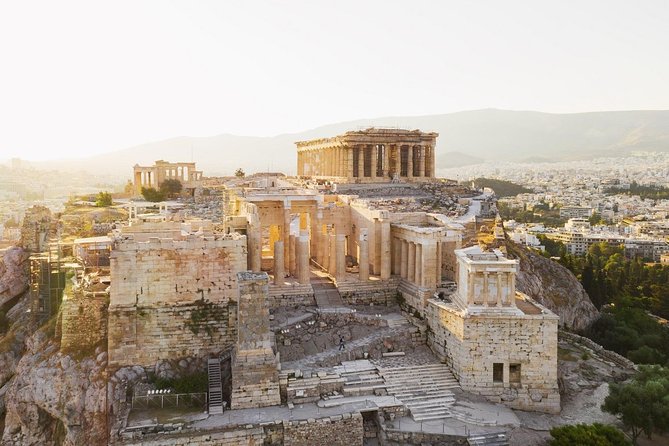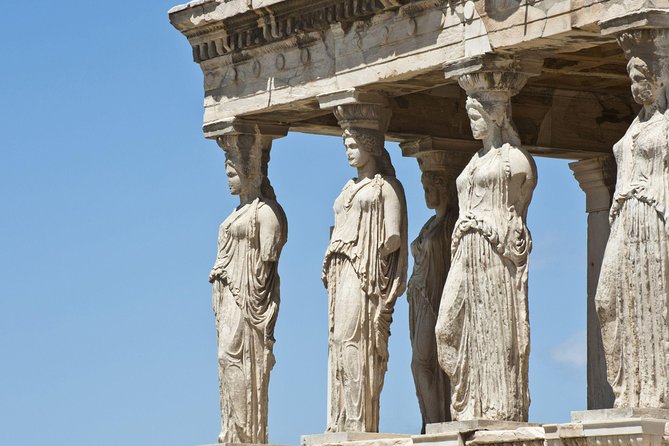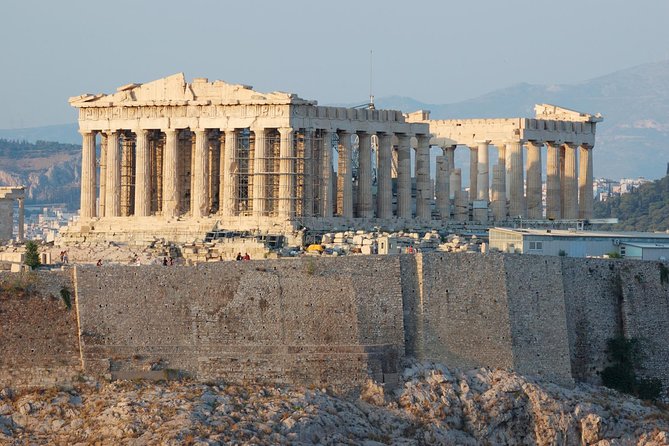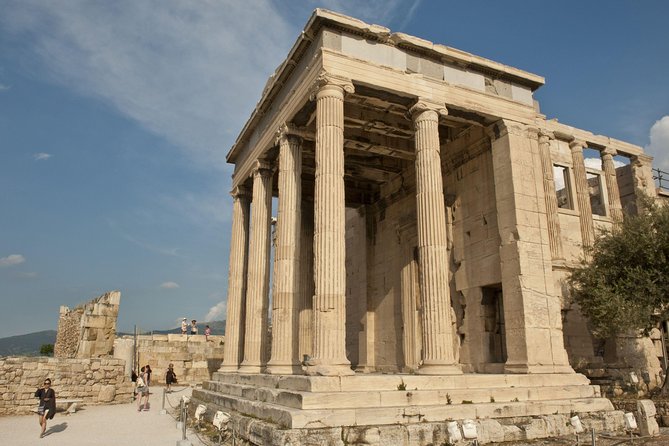The Acropolis and Slopes Skip-the-Line Ticket offers visitors a chance to explore one of the world’s most iconic ancient sites. With immediate access to the Parthenon and surrounding areas, guests can enjoy the rich history and stunning architecture of the Acropolis. From breathtaking panoramic views of Athens to insights into ancient religious practices, this experience promises an unforgettable journey through the heart of Greece’s cultural heritage. Whether you’re a history buff or architectural enthusiast, this ticket provides an efficient and engaging way to uncover the secrets of the Acropolis and its captivating slopes.
Key Points

- The Acropolis and Slopes Skip-the-Line Ticket allows visitors to bypass long queues and enjoy the rich history and architecture of this ancient Greek site.
- The ticket provides free admission for EU youth up to 25 with valid ID and children under 5 from non-EU countries, ensuring accessibility for a wide range of travelers.
- The departure point is conveniently located near public transportation, facilitating easy access to the Acropolis for visitors.
- The Acropolis offers breathtaking panoramic views of Athens, showcasing the glory of ancient Greek civilization.
- Visitors can explore the iconic Parthenon, dedicated to the goddess Athena, and discover the Klepsydra spring and caves honoring ancient deities.
Highlights of the Acropolis

As the crown jewel of Ancient Greece, the Acropolis impresses visitors with its wealth of historical significance and architectural marvels.
Atop the sacred hill, travelers can explore the iconic Parthenon, a temple dedicated to the goddess Athena that stands as a testament to the ingenuity of classical Greek design.
Nearby, the Klepsydra spring and caves honoring deities like Pan, Zeus, and Apollo offer a glimpse into the religious practices of the ancient Athenians.
From the summit, visitors can take in breathtaking views of the city and witness the enduring legacy of this UNESCO World Heritage Site, a true symbol of the glory of ancient Athens.
Here are more great tours and experiences we've reviewed in Athens
Ticket Information and Accessibility

Travelers can purchase confirmation of their Acropolis skip-the-line ticket at the time of booking.
Children and young people up to 25 from EU member states with valid ID, as well as children under 5 from non-EU countries with a passport, qualify for free admission.
The Acropolis is wheelchair accessible, with an elevator available; however, users should contact the provider in advance for details.
Customers entitled to free tickets can inform the provider for issuance alongside regular tickets. This ensures a smooth entry experience for all visitors.
Meeting Point and Logistics
The departure point for the Acropolis skip-the-line ticket is located on Via Dionysiou Areopagitou Str., Athens 105 58 Greece, near public transportation options that most travelers can conveniently utilize.
This central location makes it easy for visitors to find and access the Acropolis, one of the most iconic historical sites in Athens.
Whether you’re taking the metro, bus, or taxi, you’ll have no trouble reaching the meeting point and beginning your exploration of this ancient wonder.
The close proximity to public transit also ensures that the Acropolis is accessible to a wide range of travelers, allowing everyone to experience the grandeur of this UNESCO World Heritage Site.
Customer Ratings and Feedback
Traveler reviews for the Acropolis skip-the-line ticket offer a mixed perspective, with an overall rating of 3.3 out of 5 from 33 reviews. Positive feedback highlights the stunning beauty and historical significance of the Acropolis, but many customers report issues with receiving tickets and QR codes, leading to frustration at the entry points. Some travelers recommend booking directly at the Acropolis instead of through third-party services to avoid these problems.
| Positive Highlights | Negative Feedback |
|---|---|
| Breathtaking views | Ticketing issues |
| Rich historical value | Trouble with QR codes |
| Architectural marvels | Long wait times |
| Educational experience | Recommendation to book direct |
| Convenient skip-the-line access | Inconsistent customer service |
Visiting Tips and Recommendations

To make the most of a visit to the Acropolis, it’s best to arrive early and consider visiting during the off-season when crowds are smaller. Booking a skip-the-line combo ticket can also provide better value and access to additional historical sites.
When planning your trip, keep these tips in mind:
-
Arrive early to beat the crowds and enjoy a more peaceful experience exploring the Acropolis and its surrounding sites.
-
Visit during the off-season, such as spring or fall, to avoid the peak summer crowds and enjoy more pleasant weather.
-
Purchase a skip-the-line combo ticket to save time and gain access to more of the Acropolis’ renowned landmarks and attractions.
Following these recommendations can help ensure a smooth and memorable visit to this iconic ancient Greek site.
Here are more great tours and experiences we've reviewed in Athens
- Essential Athens Highlights Plus Cape Sounion Skip-The-Line Tour
- Acropolis Of Athens & Acropolis Museum Skip The Line Private Guided Tour
- Athens: Private Tour With Acropolis Skip-The-Line Entry
- Athens: Acropolis Museum Tour With Skip-The-Line Entry
- Athens: Sightseeing Tour With Skip-The-Line Acropolis Entry
- Skip The Line Acropolis Of Athens Private Guided Tour
Exploring the Acropolis and Slopes

With a skip-the-line ticket in hand, visitors can enjoy the rich history and captivating architecture that define the Acropolis and its surrounding slopes. Ascending the sacred hill, they’ll encounter the iconic Parthenon, a grand temple dedicated to the goddess Athena that stands as the crowning jewel of this ancient Greek citadel. Along the way, they’ll discover the Klepsydra spring, a natural water source that once quenched the thirst of the Acropolis’ ancient inhabitants, as well as caves devoted to the worship of Pan, Zeus, and Apollo. The panoramic views from the summit offer a unique vantage point to appreciate the site’s enduring significance in the annals of Western civilization.
| Key Sites | Significance |
|---|---|
| Parthenon | Dedicated to Athena, goddess of wisdom |
| Klepsydra Spring | Ancient water source for Acropolis |
| Caves of Pan, Zeus, Apollo | Sites of religious worship |
| Acropolis Slopes | Offer panoramic city views |
| Ancient Architecture | Exemplify Greek engineering and design |
Religious Sites and Architecture

Amidst the timeless grandeur of the Acropolis, visitors find themselves immersed in a captivating interplay of religious sites and architectural masterpieces that have endured the passage of millennia.
The towering Parthenon, a magnificent temple dedicated to the goddess Athena, stands as a testament to the sophistication of Ancient Greek design.
Nearby, the Klepsydra spring and the caves of Pan, Zeus, and Apollo offer glimpses into the religious practices and beliefs that once permeated this sacred space.
As visitors ascend the slopes, they’re greeted by breathtaking vistas of the Acropolis and the bustling city below, a powerful reminder of the enduring legacy of this iconic landmark.
-
Explore the Parthenon, a masterpiece of Ancient Greek architecture.
-
Discover the Klepsydra spring and the caves of Pan, Zeus, and Apollo.
-
Take in the stunning views of Athens from the slopes of the Acropolis.
Panoramic City Views
As one ascends the slopes of the Acropolis, the city of Athens unfolds before visitors in a captivating panorama. Towering monuments and bustling streets combine to create a breathtaking vista, offering a unique perspective on the ancient and modern facets of this storied Greek metropolis. From the summit, travelers can gaze out over the historic Plaka neighborhood, the iconic Parthenon temple, and the Acropolis Museum below. Beyond, the sprawling cityscape stretches to the Aegean Sea, with the Saronic Gulf islands visible in the distance. This unparalleled viewpoint allows guests to truly appreciate the grandeur and evolution of Athens, blending its celebrated past with its vibrant present.
| Panoramic Highlights | Iconic Structures | Surrounding Landscapes |
|---|---|---|
| Plaka Neighborhood | Parthenon Temple | Aegean Sea and Islands |
| Acropolis Museum | Acropolis of Athens | Saronic Gulf |
| Sprawling Cityscape | Ancient Monuments | Historic Architecture |
Frequently Asked Questions
What Are the Best Times of Year to Visit the Acropolis?
The best times to visit the Acropolis are during the shoulder seasons of spring and fall, when crowds are smaller and temperatures are mild. Visitors should avoid the hot, crowded summer months for a more enjoyable experience.
Can I Bring Food and Drinks Inside the Acropolis Site?
Visitors are generally allowed to bring food and drinks into the Acropolis site, but they’re advised to avoid large coolers or bulky items that could be disruptive. Eating and drinking are permitted in designated areas to preserve the site’s historical integrity.
How Long Does It Typically Take to Explore the Acropolis?
The time required to explore the Acropolis can vary, but most visitors spend 1-2 hours exploring the key sites. Factors like crowd size, personal interest, and pace can impact the duration. Allocating 2-3 hours allows for a thorough visit.
Are There Any Restrictions on Photography at the Acropolis?
Photography is generally allowed at the Acropolis, but visitors should avoid using flash and tripods as they are restricted. Certain areas, like the Parthenon, may have additional rules for photography to preserve the historic site.
Can I Purchase Souvenirs at the Acropolis Site?
Yes, visitors can purchase souvenirs at the Acropolis site. There are several shops and vendors offering a variety of souvenirs, including replicas of ancient artifacts, artwork, and other Greek-themed items for travelers to take home as mementos.
Recap
The Acropolis and Slopes Skip-the-Line Ticket offers an unparalleled opportunity to explore one of the world’s most iconic ancient sites.
With immediate access to the Parthenon and surrounding areas, visitors can enjoy the rich history and breathtaking architecture of the Acropolis.
This experience promises stunning panoramic views of Athens and an in-depth understanding of ancient religious practices at a UNESCO World Heritage Site.
More Skip the Line in Athens
- Acropolis Museum Skip-The-Line Ticket With Audio Guide Options
- Acropolis of Athens, Acropolis Museum Skip The Line Private Sunset Guided Tour
- Skip The Line National Archaeological Museum Private Guided Tour In Athens
- Acropolis Guided Tour With Skip-The-Line Access
- Ancient Agora of Athens Site & Museum Skip-the-Line Ticket
- Dora Stratou Greek Dancing Show Skip-the-Line Ticket
More Tickets in Athens
More Tour Reviews in Athens
- Private Full-Day Sounio Coastline Tour Attica Sunset
- Port of Piraeus to Athens City Centre
- The Ultimate 11-Day Island Tour, Paros, Naxos, Mykonos, Santorini
- 8 Days Apostle Paul Tour/Neapolis, Philippi, Veria,Thessaloniki, Athens,Corinth
- Private Day Trip to Canal,Ancient Corinth,Myceane and Nauplion
- Athens Full Day Tour
Not for you? Here's more things to do in Athens we have recnetly reviewed
- 4 Best Canoe And Kayak Experiences In Athens
- 2 Best Craft Beer Tours And Tastings In Athens
- 20 Best 2 Day Tours In Athens
- 20 Best 3 Day Tours In Athens
- 20 Best 4 Day Tours In Athens
- 11 Best Canoe And Kayak Experiences In Athens
- 25 Best Dining Experiences In Athens
- 20 Best Full-Day Tours In Athens
- 3 Best BBQ Experiences In Athens
- 3 Best Coffee Tours And Tastings In Athens
- 25 Best Sailing Experiences In Athens
- 12 Best Massage And Relaxation Services In Athens
